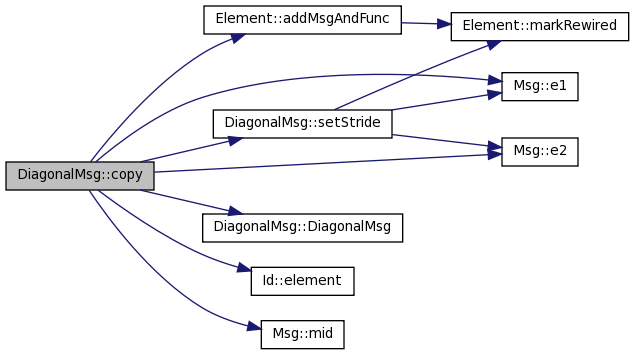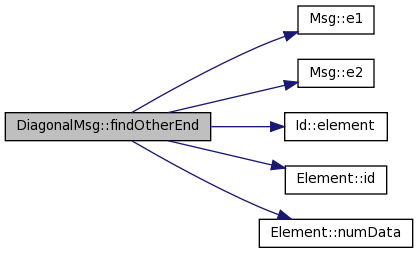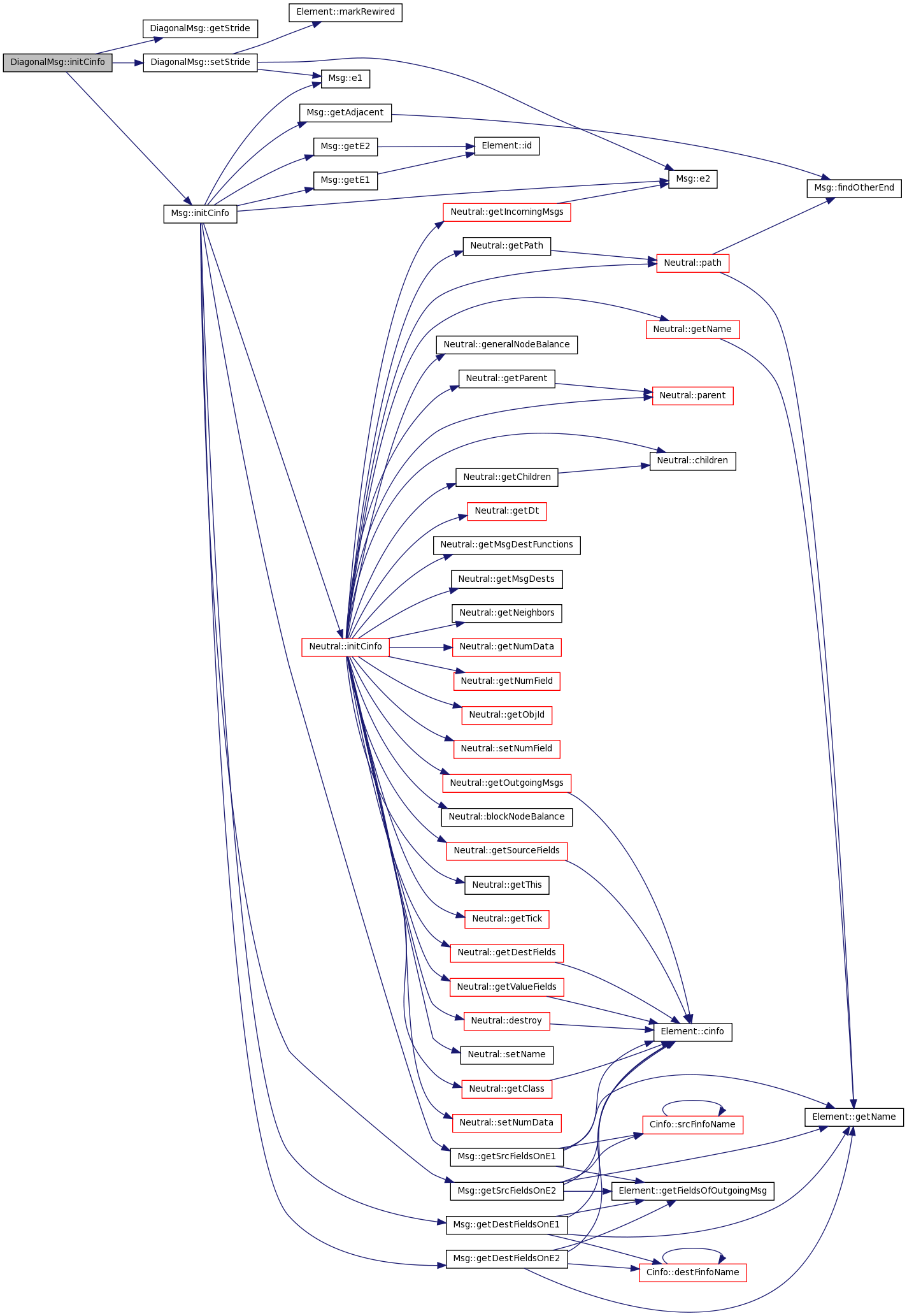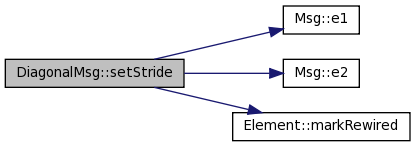DiagonalMsg Class Reference
#include <DiagonalMsg.h>


Public Member Functions | |
| DiagonalMsg (Element *e1, Element *e2, unsigned int msgIndex) | |
| ~DiagonalMsg () | |
| Eref | firstTgt (const Eref &src) const |
| void | sources (vector< vector< Eref > > &v) const |
| void | targets (vector< vector< Eref > > &v) const |
| Id | managerId () const |
| ObjId | findOtherEnd (ObjId end) const |
| Msg * | copy (Id origSrc, Id newSrc, Id newTgt, FuncId fid, unsigned int b, unsigned int n) const |
| void | setStride (int stride) |
| int | getStride () const |
Static Public Member Functions | |
| static unsigned int | numMsg () |
| Msg lookup functions. | |
| static char * | lookupMsg (unsigned int index) |
| Static function for Msg access. | |
| static const Cinfo * | initCinfo () |
| Setup function for Element-style access to Msg fields. | |
Friends | |
| unsigned int | Msg::initMsgManagers () |
Detailed Description
Connects up a series of data entries onto a matching series in a target Element. Inspects each entry, and uses the 'stride_' field to determine which should be its target.
* Suppose we have a stride of +1. Then * Src: 1 2 3 4 n * Dest: 2 3 4 5 n+1 * * Suppose we have a stride of -2. Then * Src: 1 2 3 4 n * Dest: - - 1 2 n-2 *
Constructor & Destructor Documentation
Referenced by copy().
| DiagonalMsg::~DiagonalMsg | ( | ) |
References ObjId::dataIndex, and Msg::mid_.
Member Function Documentation
| Msg * DiagonalMsg::copy | ( | Id | origSrc, | |
| Id | newSrc, | |||
| Id | newTgt, | |||
| FuncId | fid, | |||
| unsigned int | b, | |||
| unsigned int | n | |||
| ) | const [virtual] |
Make a copy of this Msg. The original msg was on origSrc. The new Msg should go from newSrc to newTgt, and have the function fid, on bindIndex b. The copy may have to be a higher-order Msg type to handle arrays if n > 1. Note that n is not the number of msgs, but the multiplier by which numData will be scaled.
Implements Msg.
References Element::addMsgAndFunc(), DiagonalMsg(), Msg::e1(), Msg::e2(), Id::element(), Msg::mid(), and setStride().

Find the other end of this Msg. In most cases this is a straightforward return of e1 or e2, plus perhaps a DataId. But in some complex msgs we need to figure out DataIds that match with the target. In many-to-one cases we just return the first entry. If no Element match, return ObjId( Id(), DataId::bad() ) If Element e matches but not DataId, return ObjId( e.id(), DataId::bad() )
Implements Msg.
References BADINDEX, ObjId::dataIndex, Msg::e1(), Msg::e2(), Id::element(), Element::id(), ObjId::id, and Element::numData().

Obtain the first target Eref for the specified Src Eref It is really meant only to work with messages with a single target ObjId for each given src, typically OneToOne.
Implements Msg.
References Eref::dataIndex(), Msg::e1_, Msg::e2_, and Eref::element().

| int DiagonalMsg::getStride | ( | ) | const |
The stride is the increment to the src DataId that gives the dest DataId. It can be positive or negative, but bounds checking takes place and it does not wrap around. This function reads the stride.
Referenced by initCinfo().
| const Cinfo * DiagonalMsg::initCinfo | ( | ) | [static] |
Setup function for Element-style access to Msg fields.
Reimplemented from Msg.
References getStride(), Msg::initCinfo(), and setStride().
Referenced by Msg::initMsgManagers().

| char * DiagonalMsg::lookupMsg | ( | unsigned int | index | ) | [static] |
Static function for Msg access.
Referenced by Msg::clearAllMsgs(), and Msg::initMsgManagers().
| Id DiagonalMsg::managerId | ( | ) | const |
| unsigned int DiagonalMsg::numMsg | ( | ) | [static] |
Msg lookup functions.
Static function for Msg access.
Referenced by Msg::clearAllMsgs(), and Msg::initMsgManagers().
| void DiagonalMsg::setStride | ( | int | stride | ) |
The stride is the increment to the src DataId that gives the dest DataId. It can be positive or negative, but bounds checking takes place and it does not wrap around. This function assigns the stride.
References Msg::e1(), Msg::e2(), and Element::markRewired().
Referenced by copy(), initCinfo(), and testFibonacci().

| void DiagonalMsg::sources | ( | vector< vector< Eref > > & | v | ) | const [virtual] |
Return all the sources of e2 from e1, that is, all the msgs coming into specified entries on e2 from e1.
ALLDATA used when the sources include all data entries on a source. Indexing is v[dataId in range e2.numData][src list]
Implements Msg.
| void DiagonalMsg::targets | ( | vector< vector< Eref > > & | v | ) | const [virtual] |
Return all the targets of e1 on e2, that is, all the msgs going from specified entries on e1 to e2. ALLDATA used when the targets include all data entries on a target. Indexing is v[dataId in range e1.numData][tgt list]
Implements Msg.
Friends And Related Function Documentation
| unsigned int Msg::initMsgManagers | ( | ) | [friend] |
The documentation for this class was generated from the following files:
- msg/DiagonalMsg.h
- msg/DiagonalMsg.cpp
 1.6.1
1.6.1